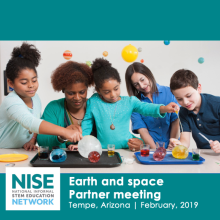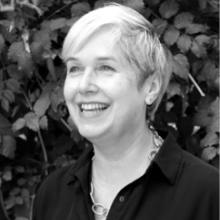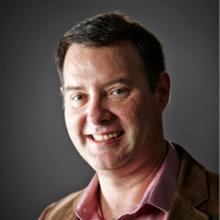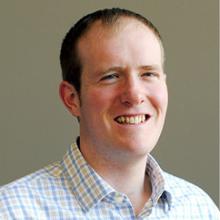-
Main meeting page: www.nisenet.org/2019-partner-meeting
- Concurrent sessions: www.nisenet.org/2019-partner-meeting-2019-concurrent-sessions
- Plenary sessions: www.nisenet.org/2019-partner-meeting-plenary-sessions
- Showcase: www.nisenet.org/2019-partner-meeting-showcase
- Photo Gallery: https://nisenet.smugmug.com/ProfessionalMeetings/2019NISENetworkPartnerMeeting
Overall Plenary Slides
-
Welcome and Introductions
Wednesday, February 13, 2019 presentation slides (PDF)
Paul Martin, Arizona State University -
Meeting goals
Thursday, February 14, 2019 presentation slides (PDF)
Larry Bell, Museum of Science -
Progress, evaluation findings, and future plans
Friday, February 15, 2019 presentation slides (PDF)
Rae Ostman & Paul Martin, Arizona State University
Kristen Erickson
Director, Science Engagement and Partnerships
NASA Science Mission Directorate
- Welcome and Introduction Video
Lindy Elkins-Tanton
Space Initiatives at ASU
Lindy Elkins-Tanton is director of the School of Earth and Space Exploration at Arizona State University, co-chair of the Interplanetary Initiative, and principal investigator of Psyche, selected in 2017 as the fourteenth mission
in NASA’s Discovery program.
The drive that humans have to explore is increasingly taking us to space. ASU is one of the university leaders in space exploration: right now we are involved in 17 active missions. Our faculty have contributed instruments to missions at the Moon, Mars, and asteroids, and we are leading missions to the Moon, to search for exoplanets, and to the metal world Psyche. Further, the ASU Interplanetary Initiative is working on defining and creating our human space future combining disciplines including policy, psychology, philosophy, sociology, science, and engineering. In this presentation I’ll talk about the progress of the Psyche mission and the latest projects in research and education in the Interplanetary Initiative.
Jim Bell, School of Earth and Space Exploration, ASU
The Ultimate Interplanetary Travel Guide: A Futuristic Journey Through the Solar System
Jim Bell is professor in the School of Earth and Space Exploration at Arizona State University and president of The Planetary Society, the world’s largest public space advocacy organization. His research group at ASU primarily focuses on the geology, geochemistry, and mineralogy of planets, moons, asteroids, and comets using data obtained from telescopes as well as spacecraft missions to these worlds.
Do you dream of traveling to other worlds? Well, then, why not? Come with noted astronomer, planetary scientist, and interplanetary travel guide Professor Jim Bell on a predictive tour of what the solar system will have to offer in the year 2218. Hiking, sightseeing, photography, musical performances, fine dining, extreme sports, even citizen science research opportunities abound across our solar system, from Mercury through the gas giants and moons of the outer planets, and even beyond. How should you dress? What should you bring? What kinds of adventures can you expect? Let’s find out!
- Prior to Jim Bell's presentation the Thursday morning video includes welcomes from:
- Paul Martin, Arizona State University
- Larry Bell, Museum of Science
- Kristen Erickson, NASA Science Mission Directorate
- Film clips shown during Jim Bell's presentation:
- Wanderers: https://www.youtube.com/watch?v=dwXqoaThGvA
- Visuals - Erik Wernquist, Music - Cristian Sandquist, Words and Voice- Carl Sagan
Ed Finn, The Center for Science and the Imagination, ASU
Science and Imagination: A Blueprint for Better Futures
Ed Finn is founding director of the Center for Science and the Imagination at Arizona State University and associate professor in the School of Arts, Media, and Engineering. He also serves as the academic director of Future Tense, a partnership between ASU, New America, and Slate Magazine, and a co-director of Emerge, an annual festival of art, ideas, and the future. Ed’s research and teaching explore digital narratives, creative collaboration, and the intersection of the humanities, arts, and sciences.
Most people don’t think about the future, or if they do, it is with anxiety or ambivalence. How can we change our relationship with the future and connect positive outcomes with our choices today? This talk will discuss the work of the Center for Science and the Imagination in designing and sharing visions of the future that are imaginative, inclusive, and inspiring.
Big Stories in Earth & Space Science
-
Introduction
Moderator: Darrell Porcello, Children’s Creativity Museum - Visualizations
Horace Mitchell, NASA Goddard Space Flight Center - Big Stories in Astrophysics
Denise Smith, Space Telescope Science Institute - HeliophysicsBig Stories in Planetary Science
Lou Mayo, NASA Goddard Space Flight Center - Big Stories in Earth Science
Lin Chambers, NASA Langley Research Center
Theresa Schwerin, Institute for Global Environmental Strategies - NASA's Solar System Trek Portals
Brian Day, NASA Solar System Exploration Research Virtual Institute
Emily Law, NASA Jet Propulsion Lab
Progress, evaluation findings, and future plans
NISE Network Earth & Space Partner Meeting 2019 - Friday Afternoon Plenary: Rae Ostman from NISE Network on Vimeo.
- Plenary Slides Friday, February 15, 2019 presentation slides (PDF)
- Rae Ostman & Paul Martin, Arizona State University
Acknowledgements
This material is based upon work supported by NASA under cooperative agreement award numbers NNX16AC67A and 80NSSC18M0061. Any opinions, findings, and conclusions or recommendations expressed in this material are those of the author(s) and do not necessarily reflect the view of the National Aeronautics and Space Administration (NASA).




